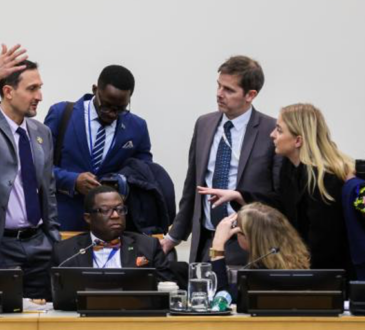
…overtaxing, inflation-based adjustments to fuel levies harmful, it says
By Patrick Paintsil
Economic policy think tank Institute for Fiscal Studies (IFS) has blown the whistle on government’s tax-laden domestic revenue mobilization approach under the three-year extended credit facility-supported programme with the International Monetary Fund (IMF) saying it is inimical to private sector growth and a drawback to the nation’s aggressive industrial drive.
“The [IMF] programme’s effort to increase government revenue mobilization relies unduly on taxes; an overreliance on taxes, however, is certain to hurt businesses and industries, and ultimately harm the competitiveness of the economy and its long-term growth potential,” senior research fellow and acting executive director of the institute, Dr. Said Boakye said at a press conference in Accra.
The 2023 budget has seen the introduction of several new taxes as a prior action for the approval of the IMF bailout programme, with more taxes anticipated under the government’s tax-centered revenue strategy.
“Although the country’s public revenue generation is low and must be expanded, a tax-centered approach is not the way to go,” Dr. Boakye reiterated.
Private sector businesses are currently overburdened with taxes amid surging inflation, an unstable foreign exchange regime and high utility tariffs but the IMF programme recommends further taxes, an action that the IFS opines could undermine its growth.
Despite consenting to most of the fiscal reforms that are prescribed under the programme, given the severity of the economic malaise, the fiscal policy think tank opined that excessive taxation coupled with other ‘unfavourable’ measures proposed by the programme could do the economy more harm than good.
Another harmful suggestion, according to the IFS, is the plan to adjust fuel levies in line with inflation and exchange rate changes to raise more revenue given the direct influence of such an action on the economy.
“Adjusting fuel levies in line with inflation will raise fuel prices and feed back into inflation thereby creating a vicious cycle of higher fuel prices and worsening inflation.
These two [over-taxing and tying fuel adjustments to inflation or exchange rates] would be too high a macroeconomic price to pay in a bid to increase revenue,” the IFS further argued.
Ghana’s three-year extended credit facility-supported programme with the IMF seeks to restore macroeconomic stability and debt sustainability whilst laying the foundations for higher and inclusive growth.
This is to be achieved on the five pillars of lasting fiscal adjustments, tight monetary and exchange rate policies, structural reforms on debt sustainability, strengthened financial sector stability and reforms that support inclusive economic growth.
The IFS further advised the government against implementing its growth-oriented programmes at the expense of strong fiscal consolidation, which is needed to restore macroeconomic stability.







